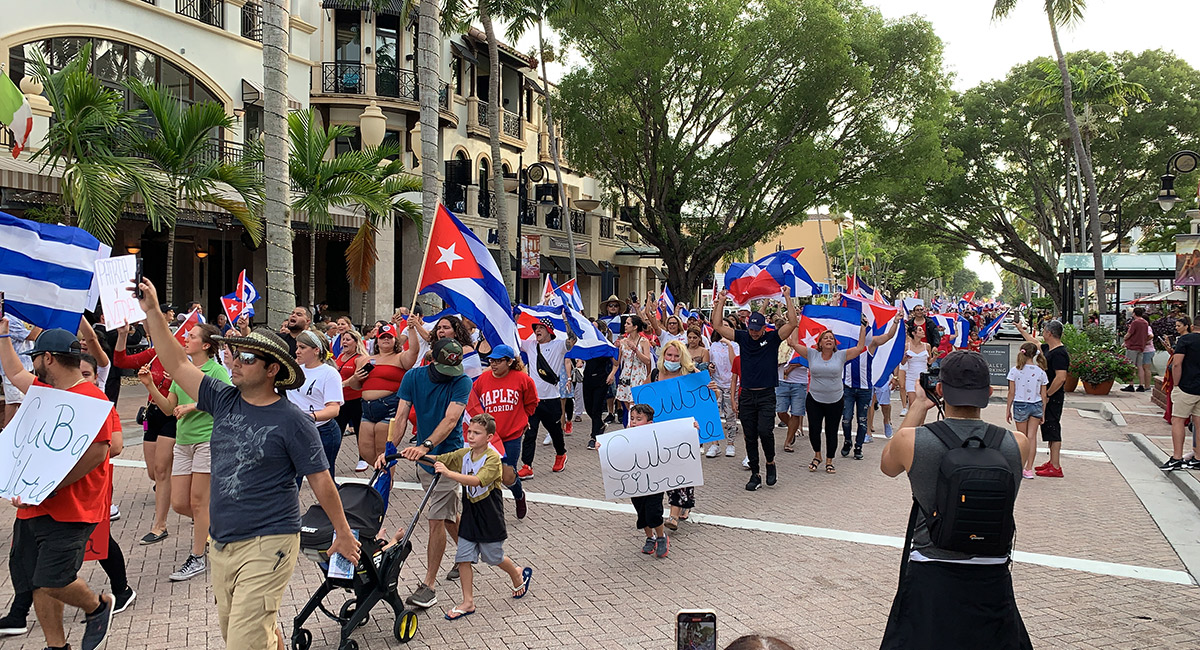Cubans took to the streets in cities around the island in the largest protests in nearly 30 years. Although hunger and other shortages helped to spark the protests, the protesters are not demanding handouts. They are demanding freedom. Ending the trade embargo is the best way for the United States to support these protesters.
The Cuban economy contracted by 11 percent during the COVID-19 pandemic. The contraction led to shortages of food, medical supplies, and other necessities. But much like the drop in oil prices that preceded Venezuela’s collapse nearly a decade ago, the external shock is not the real problem. Like Venezuela, Cuba’s underlying socialist economic system is the problem.
Socialist economic systems are defined by government ownership and control of the major industries and businesses, empowering government planners to allocate scarce resources. State ownership and management, from tourism and cigar-making to sugar milling and oil refining, has made a mess of the Cuban economy for decades.
The emergence of COVID-19 necessitated millions of adjustments to the production and delivery of goods and services. In market economies, the bulk of these adjustments were made by entrepreneurs responding to price signals and scarcities. In socialist systems, most of these changes were centrally managed. Decentralized entrepreneurial decision-making, which outperforms bumbling bureaucrats in normal times, becomes even more important in rapidly changing circumstances like a pandemic. Cuba’s planned economy was destined to fail.
In videos of protests around the country Cubans can be heard chanting,“Freedom!” Although the Cuban people understand that their socialist government is to blame for their problems, the Cuban government blames the United States and its economic embargo. The Cuban foreign ministry tweeted that “Cubans know perfectly well that the government of the United States is principally responsible for Cuba’s current situation.”
Similarly, President Miguel Diaz-Canel appeared on an emergency television broadcast to blame the crisis on U.S. policies that restrict exports and travel to Cuba. Blaming the United States for Cuba’s home-grown problems is nothing new. Fidel Castro scapegoated the U.S. embargo for decades. The United States should end this blame game to help the Cuban protesters.
The embargo, like any restriction on free trade, makes both Cuba and the United States poorer. Ending it would relieve some suffering in Cuba on the margin. But the magnitude of the suffering caused by the embargo pales in comparison to the suffering caused by the socialist planners in the Cuban government. Ending the embargo would do more to reveal the true cause of Cuban suffering than it would to relieve Cuba’s economic crisis.
Freeing trade with Cuba could do more to promote freedom in the longer run as well. Increased commerce between the United States and Cuba would help more Cubans learn how a market economy’s “rules of the game” create opportunity and promote prosperity; this would stimulate demand for the same at home.
Economists Peter Leeson and Russel Sobel call this phenomenon “contagious capitalism.” Leeson and Sobel studied changes in economic freedom in 100 countries from 1985 to 2000. They were especially interested in seeing if policy changes in one country led to similar changes in its geographically closest trading partners. And, indeed, the answer was yes—economic freedom is often contagious.
Ending the blockade would do little to fuel long-run growth in Cuba if the government’s socialist economic policies stay in place. However, if Cuban protesters unseat the regime and replace socialist planning with economic freedom, then U.S. trade and investment would rapidly jump-start the Cuban economy.
The United States should end its decades long embargo on Cuba. Ending it could both help protesters secure greater economic freedom and rapidly illustrate the superiority of a capitalist system to the Cuban people by fueling the growth necessary to bring them out of poverty.












